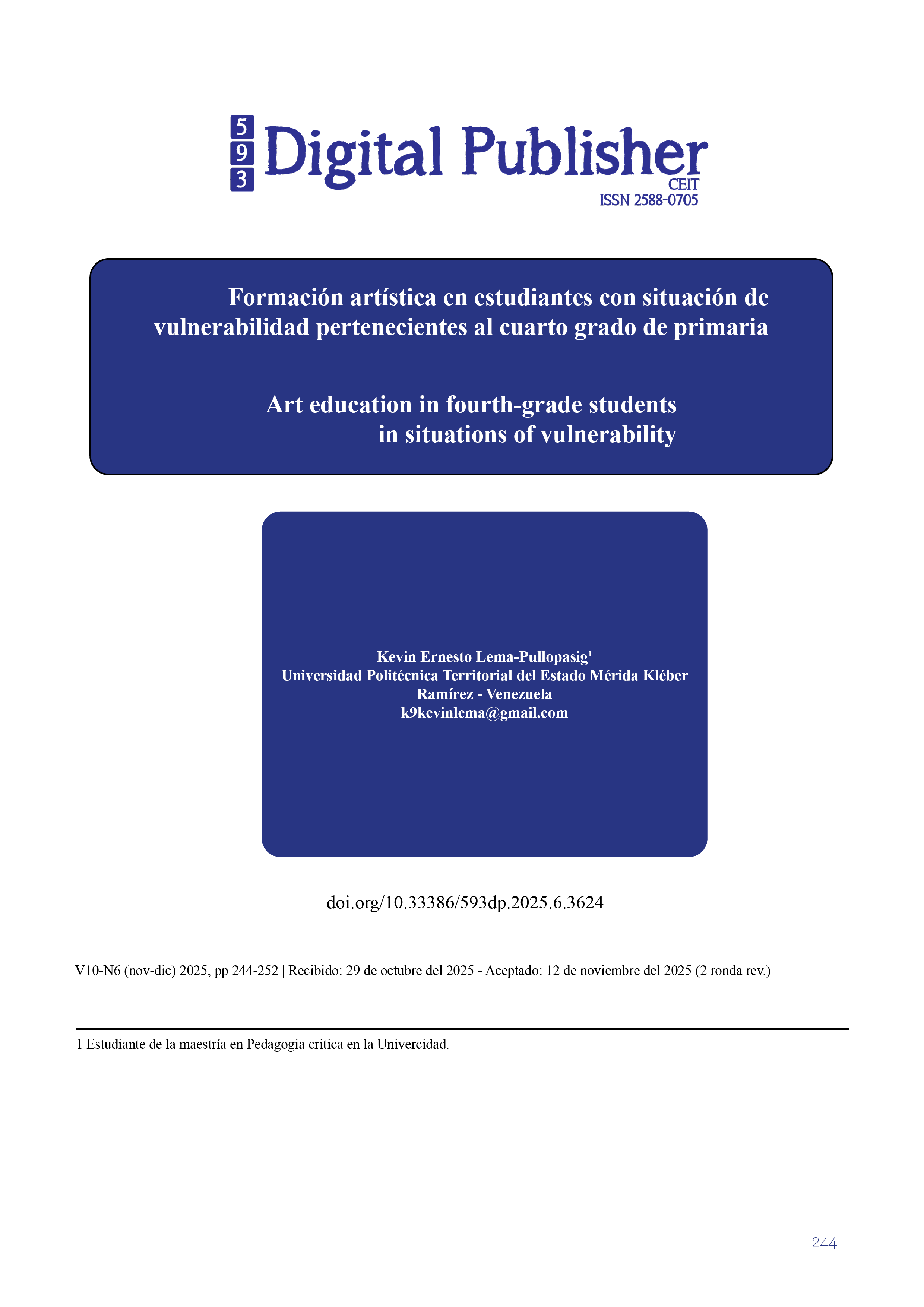Art education in fourth-grade students in situations of vulnerability
Main Article Content
Abstract
This study examines the role of art education as a strategy for educational inclusion among fourth-grade students in situations of vulnerability. The main objective was to determine how artistic practices contribute to socio-emotional development, participation, and sense of belonging in inclusive school settings. A qualitative approach with a documentary design and thematic analysis was adopted, based on a systematic review of recent academic sources indexed in Scopus, SciELO, and Web of Science. The results showed that art, through its therapeutic, social, and collaborative dimensions, fosters emotional self-regulation, empathy, and school coexistence. Facilitating factors included teacher training, curricular flexibility, and the availability of pedagogical resources, while barriers were related to traditional educational models that prioritize academic achievement over creative expression. The study concludes that art education can enhance equity and inclusion in basic education when integrated as a cross-cutting curricular component and supported by public policies and teacher development programs. It is recommended that future longitudinal research assess the long-term impact of artistic practices on school retention and students’ psychosocial well-being.
Downloads
Article Details

This work is licensed under a Creative Commons Attribution-NonCommercial-ShareAlike 4.0 International License.
1. Derechos de autor
Las obras que se publican en 593 Digital Publisher CEIT están sujetas a los siguientes términos:
1.1. 593 Digital Publisher CEIT, conserva los derechos patrimoniales (copyright) de las obras publicadas, favorece y permite la reutilización de las mismas bajo la licencia Licencia Creative Commons 4.0 de Reconocimiento-NoComercial-CompartirIgual 4.0, por lo cual se pueden copiar, usar, difundir, transmitir y exponer públicamente, siempre que:
1.1.a. Se cite la autoría y fuente original de su publicación (revista, editorial, URL).
1.1.b. No se usen para fines comerciales u onerosos.
1.1.c. Se mencione la existencia y especificaciones de esta licencia de uso.
References
Ainscow, M., & Miles, S. (2020). Inclusive education in the post-COVID era: Challenges and opportunities. International Journal of Inclusive Education, 24(14), 1527–1545. https://doi.org/10.1080/13603116.2020.1848493
Ayre, M., Gómez, S., & Duarte, C. (2022). Qualitative rigor in community-based educational research. Educational Review, 74(6), 1123–1140. https://doi.org/10.1080/00131911.2021.1998709
Booth, T., & Ainscow, M. (2019). Index for inclusion: Developing learning and participation in schools (4th ed.). Centre for Studies on Inclusive Education.
Boysen, J. (2022). Critical pedagogy and early childhood education: Building agency through play and dialogue. Early Years, 42(4), 485–501. https://doi.org/10.1080/09575146.2020.1848792
Braun, V., & Clarke, V. (2022). Thematic analysis: A practical guide for researchers. Qualitative Research in Psychology, 19(3), 438–460. https://doi.org/10.1080/14780887.2020.1769238
Broom, L., & Leggett, P. (2022). Family engagement and student motivation in low-resource schools. Education and Urban Society, 54(8), 1012–1031. https://doi.org/10.1177/00131245211000211
Darder, A. (2023). Culture and power in the classroom: Educational foundations for the schooling of bicultural students (3rd ed.). Routledge. https://doi.org/10.4324/9781003193835
Greenland, S. (2022). Educational inquiry and interpretive design in complex contexts. International Journal of Educational Research Open, 15, 100214. https://doi.org/10.1016/j.ijedro.2022.100214
Gutiérrez, C. (2023). Artistic pedagogy as a mechanism for inclusion in Latin American schools. Revista Latinoamericana de Educación Inclusiva, 17(2), 55–72. https://doi.org/10.4067/S0718-73782023000200055
Huerta, M. (2022). Barriers to artistic inclusion in basic education: Teacher training and structural limits. Educational Studies, 58(3), 271–289. https://doi.org/10.1080/03055698.2020.1842765
Kumar, D., Al-Zoubi, S., & Torres, P. (2024). Community participation and educational quality in rural schools: Evidence from developing contexts. Educational Studies, 60(2), 187–205. https://doi.org/10.1080/03055698.2023.2201025
Manrique, V., Paredes, M., & Silva, L. (2023). La corresponsabilidad familiar y su incidencia en el rendimiento escolar rural. Revista Latinoamericana de Educación Inclusiva, 17(2), 45–64. https://doi.org/10.4067/S0718-73782023000200045
Maruyama, K., Rivera, J., & Darder, A. (2023). Culturally responsive pedagogy and participatory learning environments. Learning, Culture and Social Interaction, 38, 100669. https://doi.org/10.1016/j.lcsi.2023.100669
Martínez, O. P. (2024). Evaluación del aprendizaje artístico en contextos inclusivos. Revista Educación y Humanismo, 26(1), 121–139. https://doi.org/10.17081/eduhum.26.1.5235
Nowell, L., Norris, J., White, D., & Moules, N. (2024). Thematic analysis: Advancing trustworthiness in qualitative studies. International Journal of Qualitative Methods, 23, 16094069231108224. https://doi.org/10.1177/16094069231108224
O’Cathain, A. (2020). A practical guide to quality in mixed methods research. Journal of Mixed Methods Research, 14(2), 131–144. https://doi.org/10.1177/1558689819896644
Rivera, A. (2022). Gestión escolar y participación comunitaria en contextos rurales de América Latina. Revista Educación y Desarrollo Social, 16(3), 55–74. https://doi.org/10.18359/reds.5708
UNESCO. (2023). Informe sobre el estado de la educación en América Latina y el Caribe 2023. UNESCO. https://unesdoc.unesco.org/ark:/48223/pf0000386270
Vaismoradi, M. (2020). Content analysis and thematic analysis: Implications for conducting and reporting. Nursing Open, 7(4), 1606–1614. https://doi.org/10.1002/nop2.51
Wan, C., Li, T., & Zhou, Y. (2021). Play-based learning and critical thinking development in early childhood classrooms: A systematic review. Journal of Early Childhood Research, 19(3), 263–279. https://doi.org/10.1177/1476718X20973154
Cervera, M., & Martínez, A. (2021). Art education as a pathway for inclusion in primary education: Emotional and social implications. Journal of Inclusive Education Research, 15(2), 45–61. https://doi.org/10.1080/13603116.2021.1910473
De los Santos, F., & Rojas, E. (2022). Artistic pedagogy and social inclusion in vulnerable school contexts: A qualitative approach. International Journal of Education & the Arts, 23(4), 112–129. https://doi.org/10.1080/15290824.2022.2134579
Ferrarese, L., Bianchi, S., & Conti, M. (2023). Creative practices for inclusive learning: Evidence from art-based interventions in elementary schools. Teaching and Teacher Education, 127, 104–117. https://doi.org/10.1016/j.tate.2023.104117
Gómez, J., & Pérez, R. (2020). Artistic education and social equity: Challenges for teacher training in Latin America. Revista Educación y Pedagogía, 32(83), 75–92. https://doi.org/10.17533/udea.rep.n83a04
Herrera, D., & Olivares, P. (2023). Transforming traditional pedagogy through artistic inclusion: Case study in Chilean primary schools. Arts Education Policy Review, 124(3), 135–147. https://doi.org/10.1080/10632913.2023.2190281
Mardones, L., & González, F. (2024). Approaches to inclusive collaborative learning in art education in Chile. International Journal of Inclusive Education, 28(5), 980–996. https://doi.org/10.1080/13603116.2023.2205743
Pérez-Zapata, A., Hernández, C., & López, M. (2024). Art, identity, and inclusion: Longitudinal impacts of creative education in vulnerable contexts. BMC Psychology, 12(4), 1–15. https://doi.org/10.1186/s40359-025-02476-8
Ruiz, C., & Carmona, S. (2022). Inclusive art classrooms and socioemotional development in early education. Frontiers in Psychology, 13, 987–1002. https://doi.org/10.3389/fpsyg.2022.956384
Wang, Y., & Lee, J. (2023). Art-based interventions for inclusive education: A meta-analysis of effects on student engagement and well-being. Arts & Health, 15(2), 223–240. https://doi.org/10.1080/17533015.2023.2210282


